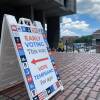With reporting and analysis from Molly Farrar and Samuele Petruccelli at Boston University’s Justice Media Computational Journalism co-Lab.
At a rally last week, former President Barack Obama had a message for young voters: “ Put down your phone, and give TikTok a rest and vote .”
Joke’s on him — and he knows it. Obama then went on TikTok to encourage this critical voting bloc to cast ballots this year.
“In 2020, a majority of people under the age of 30 voted in a presidential election the first time in history,” said John Della Volpe, the director of polling at Harvard's Institute of Politics. “So even 2008, when Obama and all the enthusiasm — when millennials were this cohort — they voted less than 50%.”
Young voters have been turning out at historically high rates in recent elections. And with polls showing that voters under 30 favor Democratic control of Congress by a nearly two-to-one margin heading into the midterms, the group might be nationally decisive in preventing a Republican Congressional takeover.
In Massachusetts, young voters recently have been the deciding factor in pushing progressive politicians into federal office. But the state’s legislative elections are the least competitive in the country, and have been for four election cycles, which leaves some struggling with when and how to make their voices heard.
Where do youth voters have the greatest impact?
Candidates in Massachusetts can — and have — tapped into the political power of young voters.
Experts say motivating the under-30 crowd with issues like climate change can be key, particularly on college campuses. In Massachusetts, home to a massive number of colleges and universities, running on a progressive platform and recruiting student volunteers can make a major difference — as it did for Sen. Ed Markey and Rep. Ayanna Pressley in recent high-profile primaries.
Brian Muldoon, a Democratic strategist who’s worked on local and statewide campaigns, said organizing a wave of young voters is easier where that population is already highly concentrated, such as college neighborhoods like Allston and Brighton.
In a handful of such pockets in Massachusetts two years ago, those voters even turned out at higher rates than adults age 30 and up. An analysis by Boston University’s Justice Media Computational Journalism co-Lab shows voters under 30 turned out in 2020 at higher rates in a few zip codes in Brighton, Allston, Somerville and by the Harvard Business School.
“There were a lot of peers in 2020 out working with the Ed Markey team, there were young voters going out to organize. It can be very effective,” Muldoon said.

Nationally, college students voted at nearly the same rate as all adults in the 2020 general election — 66% to the national average of 67%.
Across the commonwealth, in the 2020 primary elections, turnout among older voters was about 20 percentage points higher than turnout among youth — 50% to 30%. In the general election, the gap narrowed to about 14 percentage points, according to a BU co-Lab analysis — 76% to 62%.
Headed into the November elections, overall turnout will predictably lag behind presidential races like 2020. When turnout drops, the generational gap widens, with young voters heading to the polls at a much lower rate than their older neighbors.
“You see that in midterms, like the one we’re in right now, [and] it’s even more exacerbated in primaries,” said Steve Koczela, the president of MassINC Polling Group. “What that basically means then is that the voice of youth — the things that youth say they want, the things that younger voters prioritize — tend to get less attention from candidates.
“That just means that the influence of young people over state policy is less than the influence of older people,” he added.
Voting when there’s only one candidate on the ballot
A strong showing by voters under 30 this year could convince campaigns that the 2018 and 2020 numbers were not a fluke. But Massachusetts also has incredibly non-competitive elections, which could discourage voters at the local level.
New polling from Harvard’s Institute of Politics indicates Americans that age are likely to vote at similar historic highs to the 2018 midterms. Della Volpe, the institute’s director of polling, predicts a nationwide “Gen-Z wave” that will maintain the youngest voting bloc’s momentum from the last two federal elections.
Among registered voters under 30, Della Volpe’s Harvard polling predicts roughly 33% to 35% will cast a ballot in this year's midterms, which he called “essentially double the average” turnout in midterm elections for the couple decades before 2018.
But in September’s Democractic and Republican primaries for the state’s nine U.S. House seats, there were only two races where voters found more than one candidate on the ballot. Attorney General Maura Healey, a Democrat who’s favored to become the next governor, scared off three other competitors with high-profile endorsements and prodigious fundraising, leaving her unopposed in the Democratic primary. Going into the general election, 64% of state legislative seats have candidates — incumbents or newcomers — who are running unopposed.
“You have the least competitive legislative elections in the whole country right here in Massachusetts,” Koczela said. “So there's really not much of an opportunity to kind of exercise a lot of influence there.”
Beyond the ballot box
Sam White, 28, is a member of the Boston Socialist Alternative who votes “pretty much always, since forever.” But White doesn’t believe civic engagement ends with voting.

They recently helped organize a union at Darwin’s, a coffee shop in Cambridge. Civically engaged young people also lobby public officials, engage in public protests, and donate to causes they support .
“The mainstream way that democracy is talked about is that you show up to the polls every two years — and realistically, for many people, every four years — and you just kind of stand by for the rest of that time,” said White. “With the pace of crises that young people are going through right now — between COVID, between wars, between the cost-of-living crisis and runaway inflation — there just isn’t time to wait around for the next election.”
To produce this story, GBH partnered with Boston University’s Justice Media Computational Journalism co-Lab, a collaboration between the Faculty of Computing & Data Sciences’ BU Spark! program, the College of Communication, and the BU Hub Cross-College Challenge. Contributing students were Jasmine Fanchu Zhou, Artemis Huang, Dongyue Xu and Yuyan Li, with assistance from professor Brooke Williams.









